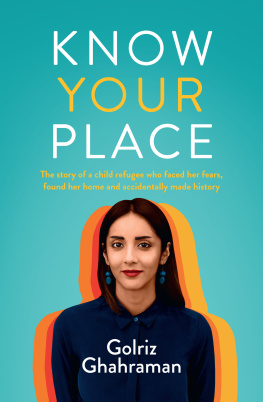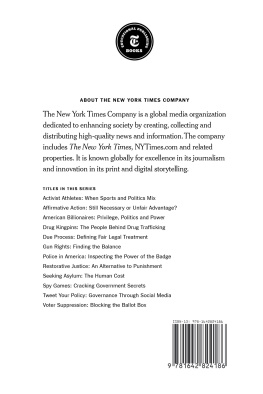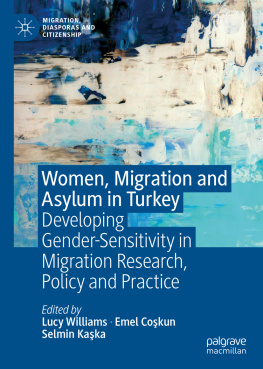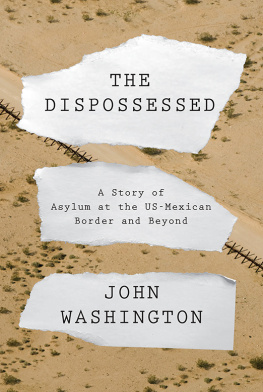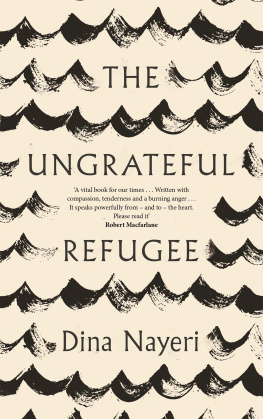
Lucy Popescu is a writer, editor and critic with a background in human rights. She was director of English PENs Writers in Prison Committee from 1991 to 2006. She has previously edited the PEN anthology Another Sky (2007) and Freedom From Tortures Body Maps (2011). The Good Tourist, her book about ethical travel and human rights, was published in 2008. She works closely with organisations working for and with refugees.
At last, here is a rich and at times beautiful insight into the painful individuality of the refugee and the life lost in the face of a collective struggle for freedom and future.
JON SNOW
Here is a powerful, and frequently harrowing, collection on the theme of the refugee. It is wonderfully various, ranging from poetry through fiction to factual pieces. I read with fascination, impressed by the variety of voices, from the use of irony to the kind of unmitigated factual account that is often the most searing in its effect. Above all, the collection makes clear the many aspects of refugee status, from the diaspora of the 20th century to the migrants of today.
PENELOPE LIVELY
A Country of Refuge
EDITED BY
Lucy Popescu

This edition first published in 2016
Unbound
6th Floor Mutual House, 70 Conduit Street, London W1S 2GF
www.unbound.co.uk
All rights reserved
Lucy Popescu, 2016
The right of Lucy Popescu to be identified as the editor of this work has been asserted in accordance with Section 77 of the Copyright, Designs and Patents Act 1988. No part of this publication may be copied, reproduced, stored in a retrieval system, or transmitted, in any form or by any means without the prior permission of the publisher, nor be otherwise circulated in any form of binding or cover other than that in which it is published and without a similar condition being imposed on the subsequent purchaser.
While every effort has been made to trace the owners of copyright material reproduced herein, the publisher would like to apologise for any omissions and will be pleased to incorporate missing acknowledgments in any further editions.
Text Design by PDQ
A CIP record for this book is available from the British Library
ISBN 978-1-78352-268-2 (trade paperback)
ISBN 978-1-78352-269-9 (ebook)
ISBN 978-1-78352-293-4 (limited edition)
Printed in Great Britain by CPI Group (UK)
Contents
Lucy Popescu
Introduction
Sebastian Barry
Fragment of a Journal, Author Unknown
Elaine Feinstein
Migrations
Roma Tearne
The Blue Scarf
Hanif Kureishi
These Mysterious Strangers: The New Story of the Immigrant
Amanda Craig
Metamorphosis 2
Stephen Kelman
Selfie
Ruth Padel
Excerpts from Children of Storm
Moris Farhi
Cloud-Dervish
A. L. Kennedy
Inappropriate Staring
Hassan Abdulrazzak
The Dog-Shaped Hole in the Garden
Sue Gee
Glimpse
Joan Smith
To Avoid Worse
Hubert Moore
Change at Leeds
For Five Refugees, One of Them a Piece of Paper
Alex Wheatle
Alfred and Vincent
Kate Clanchy
Shakilas Head
Tim Finch
A Refugees Story
Elaine Feinstein
The Old Country
Far Outside the Cities
Noo Saro-Wiwa
A Time to Lie
William Boyd
The Death of Ken Saro-Wiwa (19411995)
Rose Tremain
Excerpt from The Beauty of the Dawn Shift
Marina Lewycka
A Hard-Luck Story
Nick Barlay
An Accidental Country
Ruth Padel
Excerpts from Children of Storm
Courttia Newland
The Road to Silvertown
Katharine Quarmby
Becoming English
Roma Tearne
The Colour of Pomegranates
A. L. Kennedy
The Migrants
Biographies
Acknowledgements
Supporters
To my late mother Christine and her sisters Diana and Josephine Pullein-Thompson who taught me the importance of compassion and the power ofwords.
With special thanks
Faz Fazeli
Elisa Segrave
Dear Reader,
The book you are holding came about in a rather different way to most others. It was funded directly by readers through a new website: Unbound. Unbound is the creation of three writers. We started the company because we believed there had to be a better deal for both writers and readers. On the Unbound website, authors share the ideas for the books they want to write directly with readers. If enough of you support the book by pledging for it in advance, we produce a beautifully bound special subscribers edition and distribute a regular edition and e-book wherever books are sold, in shops and online.
This new way of publishing is actually a very old idea (Samuel Johnson funded his dictionary this way). Were just using the internet to build each writer a network of patrons. Here, at the back of this book, youll find the names of all the people who made it happen.
Publishing in this way means readers are no longer just passive consumers of the books they buy, and authors are free to write the books they really want. They get a much fairer return too half the profits their books generate, rather than a tiny percentage of the cover price.
If youre not yet a subscriber, we hope that youll want to join our publishing revolution and have your name listed in one of our books in the future. To get you started, here is a 5 discount on your first pledge. Just visit unbound.com, make your pledge and type country in the promo code box when you check out.
Thank you for your support,
Dan, Justin and John
Founders, Unbound
Introduction
Britain has a long history as a country of refuge for those fleeing conflict, poverty or terror, and this is something we should be proud of. The 1951 Refugee Convention guarantees everybody the right to apply for asylum. It has saved millions of lives. No country has ever withdrawn from it. And yet most of the refugee stories we read about in the media are negative. There is a growing anti-immigrant rhetoric and many politicians fuel these prejudices here in the UK and elsewhere. Refugees are falsely labelled economic migrants or, worse, are accused of harbouring terrorists.
I work closely with refugees as a volunteer mentor with Write to Life, Freedom from Tortures creative writing programme. The charity (formerly the Medical Foundation for the Care of Victims of Torture) was founded by Helen Bamber in 1985, to provide refugees and asylum seekers with medical treatment, counselling and therapy and to document evidence of torture. I joined Write to Life in 2010 and was immediately struck by the resilience and humour of the group. The stories I hear are about the emotional scars of torture, the pain of leaving behind loved ones and the struggles of building a new life. Imagine the sheer loneliness of sitting in a room for days or weeks on end without anyone to talk to, with nothing you hold dear, nothing that is familiar. No friends, no family. You know you are lucky to be alive, but the solitude is crushing. This is the reality for many of the refugees I know. Some have forged new lives for themselves but the relentless struggle to assimilate, to integrate in a new, often alien, culture takes its toll. Some have been forced to leave their children behind, some are coping with bereavement, some have lost their entire family. Few are able to practise their original occupations teachers, academics, writers, lawyers, journalists, accountants Most refugees and asylum seekers are desperate to return home, as soon as the situation in their country has improved.


